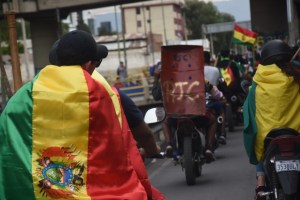Bolivia’s interim government oversaw summary executions, massacres and torture after it took power in November 2019, according to a new report compiled by international human rights experts.
The study, which was presented in La Paz on Tuesday, focused on the period surrounding the country’s contested 2019 presidential election, which sparked a wave of protests that led to Indigenous left-wing President Evo Morales being forced from office and replaced by a far-right interim administration. Numerous studies have since disputed the electoral fraud allegations.
Videos by VICE
Thirty-seven people were killed and hundreds injured in the violence in October and November 2019. The report also noted a surge in racist and sexist violence during this period.
The report highlighted two attacks on protesters in Sacaba, near the central Bolivian city of Cochabamba, and the neighborhood of Senkata, in El Alto, outside La Paz.
“[Our group] has no doubts about labelling the events in Sacaba and Senkata as massacres,” said Argentine human rights expert Patricia Tappatá, who co-authored the report.
It was likely that the military and police in Sacaba acted with intent to kill “even when people were running away” and that the deaths could be considered “summary executions,” according to the team of five independent experts from across Latin America who conducted the investigation under an agreement between the Inter-American Commission of Human Rights (IACHR) and the interim government led by Jeanine Áñez.
“They shot my son Omar Calle dead,” said Gregoria Siles Villaroel, speaking for the Sacaba victims and their families, during the report’s presentation. “They shot him in the back, straight in the heart.”
“We don’t want this to go unpunished,” she said. “What do we want? Justice!”
President Luis Arce, who attended the presentation and asked for forgiveness in the name of the state, said that the government would launch a reparations committee, and called on Bolivia’s assembly to vote for a trial of responsibilities for Áñez, a proceeding for former presidents accused of human rights abuses. If congress approves the trial by a two-thirds majority, it would be held in the Supreme Court.
The investigators said that reforming Bolivia’s judicial system to guarantee its independence would be key to pursuing justice, given the country’s long-standing problems with courts that are biased in favor of the government in power. The report also recommended holding a national summit on racism and discrimination, prioritizing sexual violence and reducing the use of preventive detention.
The 2019 conflict was split largely down lines of class and ethnicity. Indigenous, working-class Bolivians largely supported Morales while middle-class, mestizo Bolivians tended to oppose him.
The report highlights that “racist violence perpetrated against Indigenous people, including Indigenous women who were especially attacked in this period,” must be recognized and punished.
“Effectively, one of the greatest tragedies of this process is that the whole background of repression and persecution and commission of serious violations is racist,” said Paulo Abrão, former executive secretary of the IACHR.
The report was not asked to draw any conclusions on whether the interim government came to power through a coup, but it noted that Áñez was selected as president without the required parliamentary quorum and presented with the presidential sash by members of the military.
Once in office, the Áñez government’s first messages were highly religious and were accompanied by “various acts of contempt and rejection of Indigenous identity,” the report said.
A new election was finally held in October 2020. Arce, Morales’ former finance minister and the candidate for his Movement Towards Socialism (MAS), won a landslide victory.
At nearly 500 pages, the report lists a broad range of abuses and attacks, including the fatal shooting of two protesters in a clash between pro- and anti-government factions in Santa Cruz department, racist and sexist violence at the hands of motorbike gangs, and beatings and the sexual assault of anti-Morales protesters on a bus at a roadblock in Oruro department.
The investigators emphasized that it was important to recognize that there are victims “on both sides of the political spectrum.” But Abrão warned against making a “false equivalence” between the most egregious abuses at the hands of the state and violence between civilians.
Áñez has been detained since March on charges of terrorism and sedition. Several high-ranking military and police officials are also being held on charges of rights violations.
The report’s findings could make it easier to win a congressional majority for a human rights trial, said Thomas Becker, a human rights lawyer who conducted a separate investigation with Harvard Law School’s International Human Rights Clinic. Even if the trial is voted down in congress, she could still be tried on the other charges in Bolivia’s regular court system.
“I’m optimistic that this will serve as a bridge to seek justice for the victims,” he said. “They’ve done such a thorough investigation that it’s hard to refute [the abuses].
“There needs to be a clear message that you cannot shoot unarmed people and get away with it.”
More
From VICE
-

Lettuce (Credit: Sam Silkworth) -

Screenshot: Pokemon Go -

Clara Balzary -

Screenshot: NetEase



